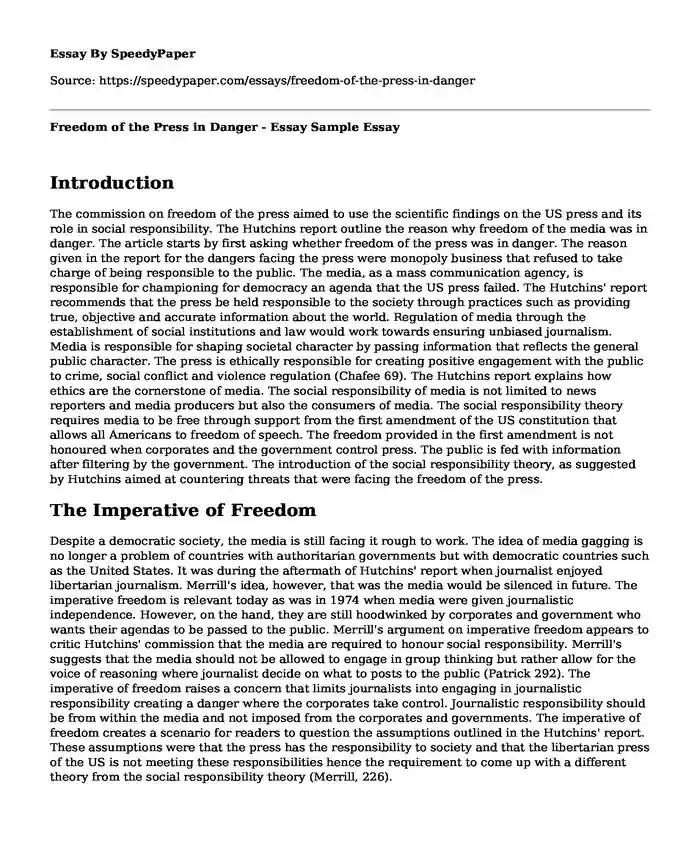
| Type of paper: | Essay |
| Categories: | United States Democracy Social media |
| Pages: | 3 |
| Wordcount: | 608 words |
Introduction
The commission on freedom of the press aimed to use the scientific findings on the US press and its role in social responsibility. The Hutchins report outline the reason why freedom of the media was in danger. The article starts by first asking whether freedom of the press was in danger. The reason given in the report for the dangers facing the press were monopoly business that refused to take charge of being responsible to the public. The media, as a mass communication agency, is responsible for championing for democracy an agenda that the US press failed. The Hutchins' report recommends that the press be held responsible to the society through practices such as providing true, objective and accurate information about the world. Regulation of media through the establishment of social institutions and law would work towards ensuring unbiased journalism. Media is responsible for shaping societal character by passing information that reflects the general public character. The press is ethically responsible for creating positive engagement with the public to crime, social conflict and violence regulation (Chafee 69). The Hutchins report explains how ethics are the cornerstone of media. The social responsibility of media is not limited to news reporters and media producers but also the consumers of media. The social responsibility theory requires media to be free through support from the first amendment of the US constitution that allows all Americans to freedom of speech. The freedom provided in the first amendment is not honoured when corporates and the government control press. The public is fed with information after filtering by the government. The introduction of the social responsibility theory, as suggested by Hutchins aimed at countering threats that were facing the freedom of the press.
The Imperative of Freedom
Despite a democratic society, the media is still facing it rough to work. The idea of media gagging is no longer a problem of countries with authoritarian governments but with democratic countries such as the United States. It was during the aftermath of Hutchins' report when journalist enjoyed libertarian journalism. Merrill's idea, however, that was the media would be silenced in future. The imperative freedom is relevant today as was in 1974 when media were given journalistic independence. However, on the hand, they are still hoodwinked by corporates and government who wants their agendas to be passed to the public. Merrill's argument on imperative freedom appears to critic Hutchins' commission that the media are required to honour social responsibility. Merrill's suggests that the media should not be allowed to engage in group thinking but rather allow for the voice of reasoning where journalist decide on what to posts to the public (Patrick 292). The imperative of freedom raises a concern that limits journalists into engaging in journalistic responsibility creating a danger where the corporates take control. Journalistic responsibility should be from within the media and not imposed from the corporates and governments. The imperative of freedom creates a scenario for readers to question the assumptions outlined in the Hutchins' report. These assumptions were that the press has the responsibility to society and that the libertarian press of the US is not meeting these responsibilities hence the requirement to come up with a different theory from the social responsibility theory (Merrill, 226).
Works Cited
Chafee, Zechariah. A Free and Responsible Press: A General Report on Mass Communication: Newspapers, Radio, Motion Pictures, Magazines, and Books... University of Chicago Press, 1947.
Merrill, John Calhoun. "The imperative of freedom: A philosophy of journalistic autonomy." (1974).
Patrick Lee Plaisance. (2005) The Mass Media as Discursive Network: Building on the Implications of Libertarian and Communitarian Claims for News Media Ethics Theory. Communication Theory 15:3 pages 292-313.
Cite this page
Freedom of the Press in Danger - Essay Sample. (2023, Aug 31). Retrieved from https://speedypaper.com/essays/freedom-of-the-press-in-danger
Request Removal
If you are the original author of this essay and no longer wish to have it published on the SpeedyPaper website, please click below to request its removal:
- Essay Sample: Common Theme Between Xala and Faat Kine
- Free Essay Example: Animations and How It Is Perceived
- Free Essay on Personal Code of Ethics
- Essay Sample on Performance Management in the Public Sector, Non-Profit Sector, and Government
- Specialty Courts - Essay Example
- Free Essay - The Great Chicago Fire of 1871
- Balanced Budget Amendment to the US Constitution - Essay Sample
Popular categories




